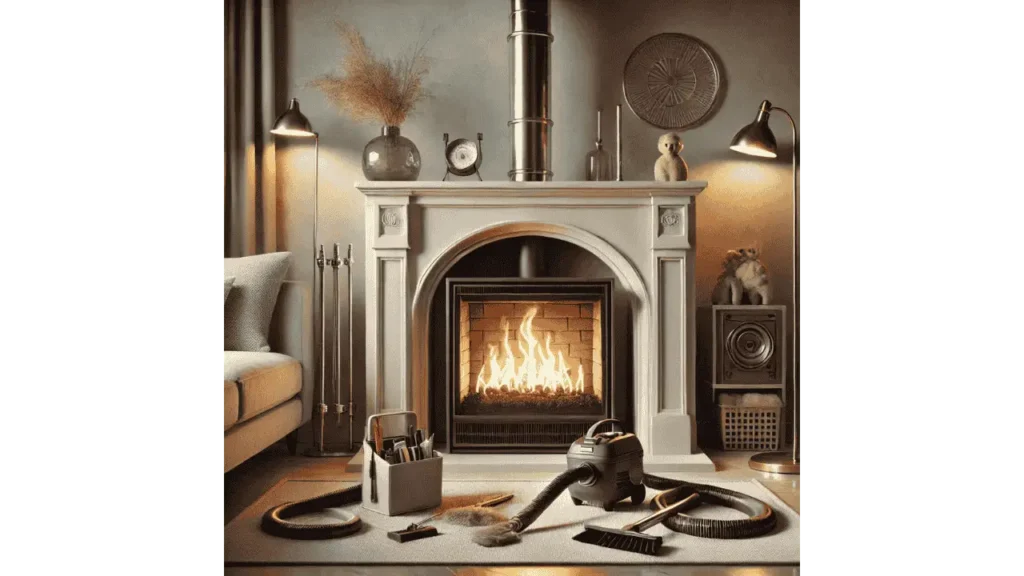Many people think gas fireplaces don’t require much maintenance, but neglecting chimney cleaning can lead to hidden risks like poor venting and corrosion. I’ve learned that even gas fireplaces benefit from regular upkeep to stay safe and efficient. In this guide, we’ll cover why gas chimneys still need cleaning, how often to schedule it, and tips for maintaining your fireplace throughout the season. With a little care, your gas fireplace can keep providing safe, reliable warmth all winter long.
Chimney Gas: Do Gas Fireplace Chimneys Need to Be Cleaned?
Even though gas fireplaces burn cleaner than wood, their chimneys still require regular cleaning. Gas combustion produces “chimney gas,” which includes small amounts of water vapors and carbon monoxide. Over time, this can lead to residue buildup or moisture that, if not properly vented, can damage your chimney and reduce efficiency. I’ve realized that keeping up with chimney maintenance not only improves safety but also keeps the fireplace running smoothly, so it’s definitely worth the extra care.

Understanding Chimney Gas and Why It Matters
Chimney gas refers to the byproducts of gas combustion, including carbon monoxide and water vapor. While gas burns cleaner than wood, these byproducts can still lead to buildup in the chimney over time. Proper venting is essential to prevent moisture and residue from collecting, which helps keep your chimney in good shape and your home safe.
Why Chimney Gas Needs Proper Venting
Proper venting allows chimney gas to exit your home efficiently, preventing buildup of potentially harmful gasses like carbon monoxide. Without adequate venting, moisture and residue can collect, leading to corrosion, reduced fireplace efficiency, and even health risks. A well-vented chimney keeps everything running smoothly and safely.
Risks of Ignoring Chimney Gas Venting
Neglecting chimney gas venting can result in serious issues. Moisture buildup can lead to rust and corrosion within the chimney, while trapped gasses pose safety hazards. Ignoring these risks could lead to costly repairs or, worse, endanger the air quality in your home. Regular venting and maintenance are key to preventing these problems.
Why Gas Fireplace Chimneys Still Need to Be Cleaned
Even though gas fireplaces don’t produce ash and heavy soot like wood fireplaces, their chimneys still benefit from regular cleaning. Cleaning helps remove any debris, checks for corrosion, and ensures that the system is venting properly. Here’s why it matters:
Removal of Debris and Obstructions
Over time, leaves, dust, and even small animals can find their way into your chimney, creating blockages that restrict airflow. Removing these obstructions keeps the chimney clear, allowing chimney gas to vent safely and preventing potential fire hazards. I’ve found that keeping the chimney clean improves both safety and efficiency.
Inspection for Creosote and Soot Buildup
While gas fireplaces produce far less creosote and soot than wood fireplaces, small amounts can still accumulate over time, especially if the fireplace is used frequently. Regular inspections ensure any buildup is removed before it affects performance or becomes a fire risk. Even a thin layer of buildup can reduce efficiency, so it’s worth checking periodically.
Preventing Corrosion
The moisture in chimney gas can lead to corrosion inside the chimney lining, especially if venting isn’t optimal. Corrosion weakens the chimney structure, which can become a costly problem down the road. Regular cleanings help remove moisture, reducing the chances of rust or corrosion and extending the life of your chimney.
How Often Should You Clean a Gas Fireplace Chimney?
For gas fireplaces, it’s generally recommended to have the chimney cleaned and inspected at least once a year. However, factors like frequent use, local climate (especially if it’s humid), and any signs of reduced efficiency can increase the need for cleaning. Regular annual maintenance helps ensure safe venting, prevent corrosion, and keep your fireplace running efficiently throughout the season.
Factors That Might Increase the Need for Cleaning:
While an annual cleaning is standard, certain factors may require more frequent maintenance. If you use your gas fireplace heavily during the winter or live in a humid area, moisture buildup can happen faster, increasing the chance of corrosion. I’ve found that checking the chimney mid-season helps catch any early signs of buildup, especially during colder months.
Professional vs. DIY Chimney Cleaning
While DIY cleaning kits are available, a professional cleaning ensures a thorough job. Pros have the tools and experience to spot issues like early-stage corrosion or hidden blockages that we might miss. Personally, I prefer calling a professional at least once a year for peace of mind, especially before winter hits.
Benefits of Hiring a Professional:
Hiring a professional means your chimney gets a detailed inspection along with the cleaning. Pros can identify potential issues like leaks, corrosion, or ventilation problems that could become safety hazards. Plus, they’re efficient, I’ve found that a pro can complete a deep cleaning much faster and more thoroughly than a DIY attempt.
Additional Tips for Gas Fireplace Maintenance
Keeping your gas fireplace in great shape is easier with a few simple habits. Here are some tips to make maintenance more manageable:
Regularly Check for Debris
Even with a gas fireplace, debris can collect in and around the chimney. Give it a quick check every few months, especially before peak season, to clear out any leaves or blockages that could restrict airflow.
Clean the Glass
The glass on your gas fireplace can develop a cloudy film from regular use. Wipe it down with a non-abrasive cleaner every so often to keep it clear and looking great.
Test the Carbon Monoxide Detector
A carbon monoxide detector is essential when using any gas appliance. Test yours monthly to ensure it’s working, and replace the batteries as needed to keep your home safe.
Conclusion: Don’t Neglect Chimney Gas Maintenance
Regular cleaning and maintenance of your gas fireplace chimney are essential for safe, efficient operation. By clearing debris, checking for buildup, and scheduling annual professional inspections, you can keep your fireplace in top condition all season long. A little routine care goes a long way, ensuring your fireplace remains a cozy and reliable part of your home.
- How to Build an Electric Fireplace Wall? - June 4, 2025
- How to Clean an Electric Fireplace? - June 3, 2025
- How to Fix an Electric Fireplace? - June 2, 2025

